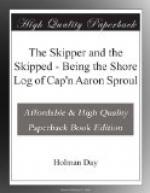“I’ve come to call on for town help,” she said. “I haven’t got scrap nor skred to eat, and northin’ to cook it with. You’ve gone to work and put us in a pretty mess, Mister S’leckman. Makin’ my husband an outlaw that’s took to the woods, and me left on the chips!”
The Cap’n surveyed her without speaking—apparently too crushed to make any talk. In addition to other plagues, it was now plain that he had brought a pauper upon the town of Smyrna.
“So I call on,” she repeated, “and I need a whole new stock of groc’ries, and something to cook ’em with.”
And still the Cap’n did not speak. He sat considering her, his brows knitted.
“I’m a proud woman nat’rally,” she went on, “and it’s tough to have to call on ’cause the crowned heads of earth has oppressed the meek and the lowly.”
Cap’n Sproul trudged across the room, and took down a big book inscribed “Revised Statutes.” He found a place in the volume and began to read in an undertone, occasionally looking over his specs at her.
“It’s as I thought it was,” he muttered; “when one member of a family, wife or minor children, call on for town aid, whole family can be declared paupers till such time as, and so forth.” He banged the big book shut. “Interestin’ if true—and found to be true. Law to use as needed. So you call on, do you, marm?” he queried, raising his voice. “Well, if you’re all ready to start for the poor-farm, come along.”
“I ain’t goin’ onto no poor-farm,” she squealed. “I call on, but I want supplies furnished.”
“Overseer of the poor has the say as to what shall be done with paupers,” announced the Cap’n. “I say poor-farm. They need a good, able-bodied pauper woman there, like you seem to be. The other wimmen paupers are bedridden.”
“My husband will never let me be took to the poorhouse and kept there.”
“Oh, there ain’t goin’ to be any trouble from that side. You’re right in line to be a widder most any time now.”
“Be you goin’ to kill ’Liah?” she wailed.
“It will be a self-actin’ proposition, marm. I ain’t got any very special grudge against him, seein’ that he’s a poor, unfortunate critter. I’m sorry, but so it is.” He went on with great appearance of candor. “You see, he don’t understand the nature of that stuff he’s luggin’ round. It goes off itself when it gets about so warm. It’s comin’ warmin’ weather now—sun gettin’ high—and mebbe next time he starts for the village the bust will come.”
“Ain’t any one goin’ to warn him?”
“I can’t find it’s set down in my duties, marm; and from the acts of the gen’ral run of cowards in this town I don’t reckon any one else will feel called on to get near enough to him to tell him. Oh no! He’ll fire himself like an automatic bomb. Prob’ly to-morrow. By the looks of the sky it’s goin’ to be a nice, warm day.”
She backed to the door, her eyes goggling.




